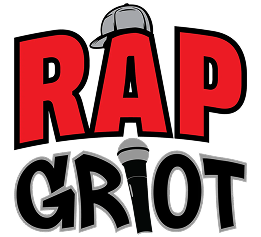
They say when Black people want to get themselves together, they pack up and move to Atlanta.
Maybe the atmosphere and energy of Atlanta is what was needed for the 95th Annual MLB All Star Game to rejuvenate the Black community’s interest in baseball. Not only as fans, but as coaches, managers, media and of course, the players. Let’s not act like the disinterest wasn’t manufactured, though.
Whether you blame financial disparities, the crack epidemic, the character assassination of some of the game’s best Black ballers or the sudden corporate interest in Black-dominated sports i.e. football and basketball, Black people stopped showing up for baseball over three decades ago. In the stands and on the field. Until last week in Atlanta.
Major League Baseball showed an unprecedented level of honor and respect to Black Baseball; its history, culture, fashion, entertainment and hidden talent were all given its proper recognition throughout the week in the Metro Atlanta suburb of Cobb County.
Starting with the HBCU Swingman Classic, which was its third annual, was sponsored by T-Mobile and powered by the MLB/MLBPA Youth Development Foundation, was an All-Star experience for 60 0f the top baseball student-athletes from Division-I programs at Historically Black Colleges and Universities. The Atlanta edition boasted the attendance of former Braves players Brian Jordan and David Justice, who filled in the managerial roles for the NL and AL teams. Also, former Black Baseball greats Dusty Baker, Ken Griffey Jr. and Andre Dawson, who was actually drafted in 1975 to the MLB after playing three years at Florida A&M University, an HBCU in Tallahassee.
Hosted by MLB’s Xavier Scruggs and A.J. Andrews, the Celebrity Softball Game brought out the best of Atlanta’s star power and culture. The fun-filled event featured ATL legends like Chris Tucker, Jermaine Dupri, and Ludacris sharing the diamond with Hall of Famer CC Sabathia and a diverse roster of talent, including Storm Reid, J.I.D, Dascha Polanco, Michael Kelly, and Harry Douglas.
Team Jermaine Dupri went head-to-head with Team Javy Lopez, with both squads proudly representing the A in full force. The game also spotlighted MLB’s longstanding partnership with the Boys & Girls Clubs of America, with several celebrity players, like Storm Reid and Quavo, returning as proud BGCA alumni.
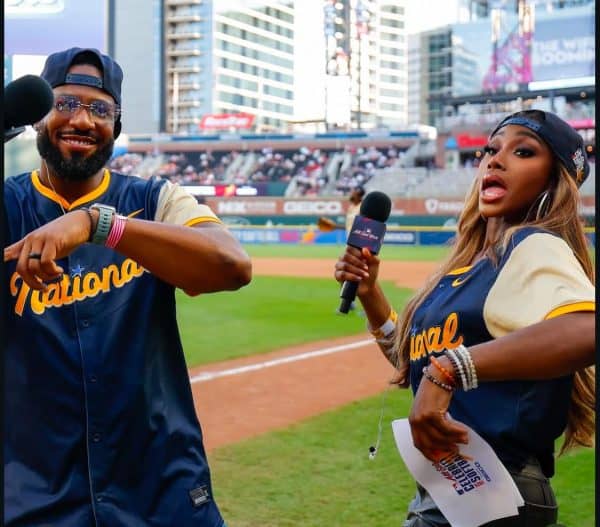
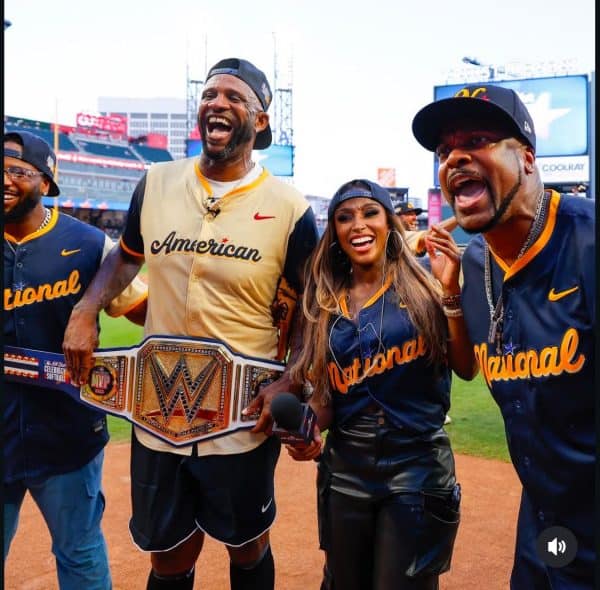
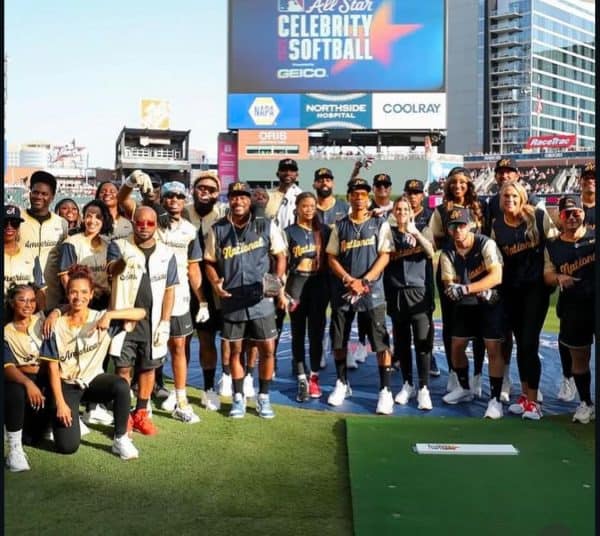
The cultural impact was felt far beyond just sports and music. Not just by rappers and actors who hail from the “Black Mecca,” but also the recent influx of influencers, who are now integral to the entertainment landscape. Social media stars like Livvy Dunne, Druski, Nicky Cass, Funny Marco, and Jake Storiale brought a fresh energy that reflected the evolving face of celebrity in Atlanta and beyond. From hometown heroes to rising digital icons, the game perfectly blended hip hop, sports, and entertainment into one unforgettable ATL moment.
One of the most celebrated aspects of the All Star break, but the least recognized by the fans is the MLB Draft. This year’s draft, which took place across the street from Truist Park at the Coca Cola Roxy, was expected to at least match the percentage of Black draftees from last year(30%). Out of the 27 players drafted in the first round, the first two Black players appeared in the number 15 slot(Oklahoma’s Kyson Witherspoon) who went to the Red Sox while the Diamondbacks chose Southern U’s Kayson Cunningham, who was the number 18 overall draft pick. Also, there were four players who came from HBCUs that were called up to the Major Leagues: Alabama State RF Kameron Douglas, who was drafted by the Detroit Tigers, his college teammate Juan Cruz, who was drafted by the Nationals, Cardell Thibodeaux Jr.(Southern University) who was drafted by San Diego and FAMU’s Broedy Poppell was drafted by the San Francisco Giants. This type of representation in the draft hasn’t been seen in over three decades and everyone including Rob Manfred and MLB are inviting the paradigm shift.
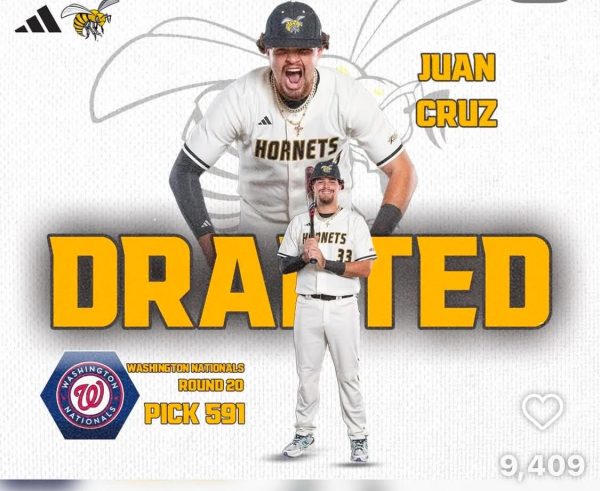
Another of the least publicized contributors to the vibe of ATL’s All Star Week was a homegrown group known as Minority Baseball Prospects. Founded and facilitated by brothers Tyrone and Alex Wyche and former Grambling State Baseball Coach Reginald Hollins, MBP has created a home based pipeline over the past five years for Black players around the country and this year’s All Star Week left the Wyche brothers and Mr. Hollins with a lot to be grateful for. Besides hosting a comedy show, youth baseball clinic and an All American Game featuring the top high school ballers in the country, MBP had some unmatched recruitment stats by any other scouting or recruitment organization represented throughout ASW in ATL. In the Draft, 26 former or current Minority Baseball Prospects players were drafted, including 21 MBP All-Americans and 5 HBCU All Stars. As if MBP could possibly have earned any more accolades, the crew has landed a humongous collaboration cleat with one of the biggest athletic companies in the world, but the collab is so recent, it cannot be announced at the time of this writing.
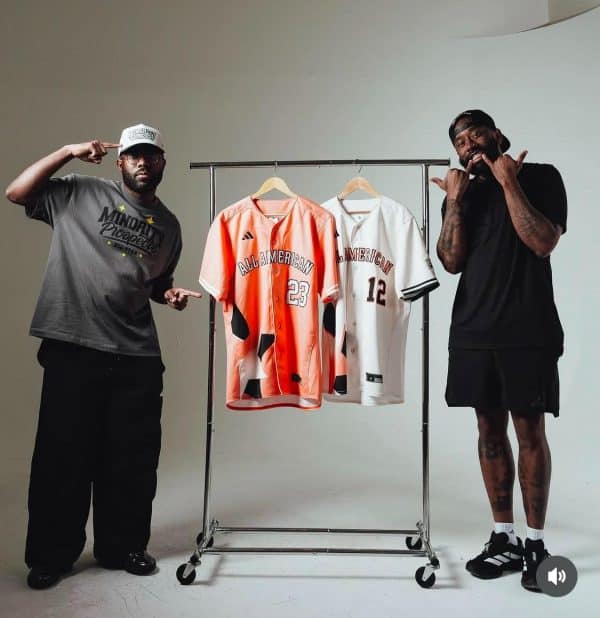
None of these initiatives would even be considered if it wasn’t for the 150 former and current MLB players who make up The Players Alliance. The TPA, which was founded in 2020, aims to address systemic barriers to equity and inclusion in baseball by creating pathways to opportunities for Black talent, both on and off the field. The TPA’s Board of Directors, which includes 2025 HOF inductee CC Sabathia, founding board member Edwin Jackson and the Board of Directors Chairman and Hall of Famer Curtis Granderson, continue to use their collective voice and platform to create increased opportunities for the Black and Brown community in every aspect of the game. During ASW, The Players Alliance hosted The Game Changers Celebration, which recognized and honored three defining eras of the legends, stars and heroes of the Atlanta Braves. The guests included the likes of Braves pitching ace Marvin Freeman, HOFer Dusty Baker, Marquiss Grissom, David Justice, Ron Gant and many more. TPA also facilitated the “Amplified” panel discussion, which featured TPA’s Board of Directors(Sabathia, Granderson and Jackson), Eric Davis, prince Fielder and David Justice. Amplified aimed to make the voices and perspectives of former World Series champions and All Stars and their current view of the ever evolving game more visible. There was also a Players Alliance Service event on Monday with local youth to be followed by a special announcement about a new. youth-focused program benefitting students in the Atlanta area and beyond.
The history of Black baseball players and the challenges they faced since the inception of baseball in the U.S. in 1890 has to be preserved in order for the next generation of ball players to fully comprehend their roles in upholding the legacy of players that sacrificed all but their lives to play the game. The Negro Leagues Family Alliance is an organization that unites the descendants of former Negro League players in order to keep the conversation about the segregated leagues current and relevant. The NLFA, which is headed by Sean Gibson, the great grandson of Negro League legend Josh Gibson, aims to collectively preserve the legacies, history and intellectual properties of the Negro Leagues while contributing to the education and uplift of baseball and sports. On Saturday, The NLFA held their Pitch In For A Cause event in conjunction with Martinez Beisbol Films, a special reception that showcased Black and Afro-Caribbean baseball pioneers.
No one expected the finale for the week would be as grand as the Braves’ Hank Aaron tribute, that has become a viral moment online ever since the spectacular light show in Truist Park on 7/15. Mathematically sound, the tribute was a soldier’s salute to Aaron for his historic 715 HR in Turner Field, breaking Babe Ruth’s long standing record on July 15, 1974. The unprecedented visual was the perfect cherry on top of an incredible week of baseball in the largest Black metropolis in the country. As his widow Billye Aaron looked on in admiration, it could only be imagined what Black baseball player will be praised in such a way in the next half century.
With all of these activations celebrating the contributions and accomplishments of past, present and future Black baseball players, there’s no doubt that All Star Week in Atlanta was not only good for the sport, but great for the marginalized community who has helped build the sport’s popularity and created opportunities for all participants despite race, color or country of origin.
